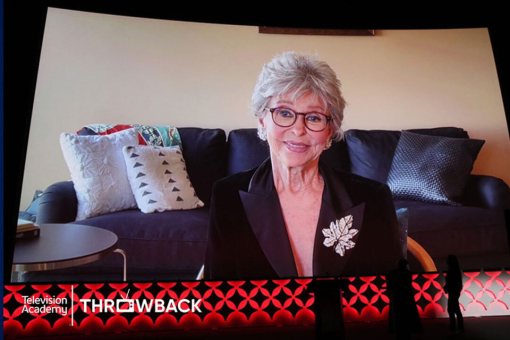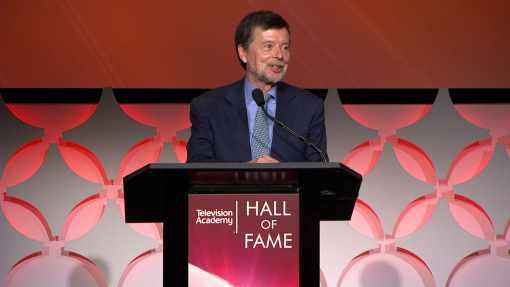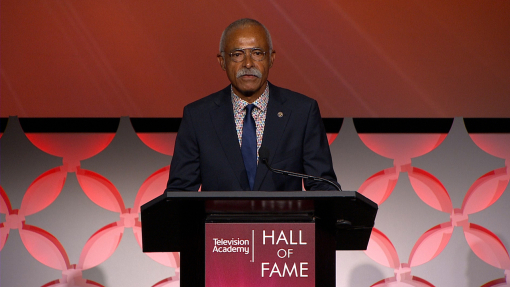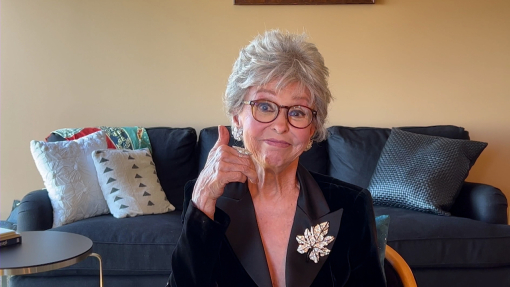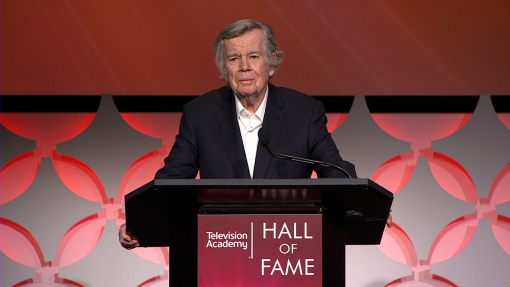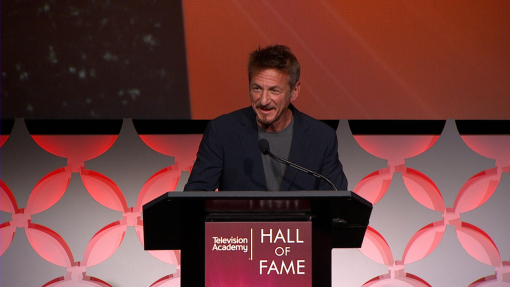William Shatner is a TV icon whose breakthrough role as Captain James T. Kirk on the television series Star Trek helped launch a universe of sci-fi conventions, TV series, movies and books.
He’s also the guy whose mastery of self-parody has put him in a league of his own — from the unabashed spoofing of his Priceline commercials to the mock-ironic near-greatness of his pop records and the jazzy swagger of his Primetime Emmy Award-winning character on Boston Legal — all of which has led to one of the most remarkable third acts in the history of television.
Now, at a very busy 75 years of age, Shatner is enjoying a banner year, one that has included a third Emmy nomination for the role of Denny Crane (he’s won two, so far) and an induction into the Academy of Television Arts & Sciences’ Hall of Fame. Is he taking it in stride? Actually he’s the one who seems most surprised, not to mention surprisingly modest.
Upon receiving the Hall of Fame call, Shatner says, “I screamed a little high-pitched scream that only dogs could hear, thus expressing my joy and consternation.”
He explains: “It’s elite company, and I wish I felt worthy.” He surmises, “Probably it’s based on my body of work. I think I’ve outlasted most people, and that’s part of it.”
And allows: “I’m in television, and it’s a pinnacle of that. What more could I hope for?”
Of course, it hasn’t always been such a lark to be William Shatner. “I’ve had tough years, a lot of trepidation, but I’ve never given up,” he says.
And therein lies a tale.
It began in the 1930s at a summer camp in Montreal, where, as a youngster, he caught the acting bug after his role in a play moved some members of the audience to tears. As a young man, he brought his characteristic drive and energy to the drama department at Montreal’s McGill University, where he wrote, directed and starred in musicals. His father discouraged a career in the arts, so Shatner got a business degree, but when the theater company where he landed his first job fired him as an assistant manager, he was kept on as an actor. In 1954, he was invited to join the company of the new Shakespeare Festival in Stratford, Ontario, led by Tyrone Guthrie. By the time the television industry began gearing up in New York and Hollywood, the youthful leading man had amassed an unusual degree of experience and confidence.
Shatner began to find steady work with a string of guest starring roles in the medium’s early anthology series, but it was the role of a mental patient who spies an apparition on the wing of an airplane in a 1963 episode of The Twilight Zone that made one of his first lasting impressions.
He would soon make another — at the command of the USS Starship Enterprise. Surprisingly, Shatner wasn’t the first to stride boldly onto the bridge in a gold jersey and black boots; he was a replacement captain called in when the producers made the decision to re-cast the lead in a failed pilot. “The thing that struck me was the seriousness with which [the characters] took themselves,” says Shatner. “I remember commenting to [series creator] Gene Roddenberry that it would be nice to go a little lighter with the role.”
It proved to be a fortuitous choice. The chemistry between Shatner, as the bemused and impulsive commander, and Leonard Nimoy, as the humorless but thoughtful Vulcan science officer Spock, brought a compelling humanity to this strange new science-fiction world. “My thought was, simply, a guy who’s standing on the bridge of a ship for years would not think that this was all so dramatic day after day. Even in a life-or-death situation, he’d be thinking, ‘I’ve been here before, so what’s for dinner?’”
But the worldwide phenomenon that the series was to become was not yet visible, at least to the network. Despite the public’s fascination with the real-life space race unfolding at the time, ratings were low for the final-frontier saga, and NBC canceled Star Trek in 1969, after only three seasons.
In turn, Shatner’s marriage, which had suffered during the demanding series, also came to an end. The actor says he was reduced to living in a camper attached to a used pickup truck as he scrounged for a new identity in a business that seemed reluctant to re-cast him.
Things got so low, he recalls, that only desperation kept him going. “There comes a moment in an actor’s life where you either decide to go back to some standard way of making a living or throw the dice for the rest of your life, because at a certain point there’s no going back. You are what you are; now you have to live by your decision, and that’s a high stress situation.”
He embarked on a decade’s worth of guest shots on such ’70s-era shows as Marcus Welby, M.D. and Kung Fu — working, always working, but at a level well below what his future had once promised.
Meanwhile, unbeknownst to him, a phenomenon was brewing. Reruns of Star Trek were developing a cult following on independent stations around the country. The first Star Trek convention, held in New York in 1975, outdrew expectations, revealing the intensity of the fan fervor. When George Lucas’s 1977 film Star Wars blew the doors off the market for sci-fi, a Star Trek movie was suddenly a given. The captain’s quarters beckoned once again.
Shatner was back at the helm of the Enterprise, this time on the big screen. The first Star Trek movie earned $175 million — an enormous sum in 1979 — and launched a series of sequels. Revenue from conventions and personal appearances began to roll in. By 1982, Shatner was finding renewed popularity on TV as well, as the star of the police series T.J. Hooker and the host of Rescue 911.
Another long-forgotten project — an album of outlandish-seeming poetry and pop songs called The Transformed Man, recorded by Shatner in 1968 — suddenly bore strange fruit. An executive at Priceline appreciated the lounge-singer dramatics on the record and asked Shatner to do commercials in that vein. The ads developed a cult following almost as devoted as those for Star Trek.
Among the devotees was a television producer with a famously offbeat sense of humor, David E. Kelley. Kelley invited Shatner to lunch to discuss a character who would go on to a Primetime Emmy-winning six-part arc on The Practice — that of the eccentric and self-important attorney Denny Crane. “We have to be willing to laugh at this character, and with this character, and sometimes when he speaks, we won’t know what he’s talking about,” said Kelley. “Shatner came in and inhabited this character from day one.”
Kelley then spun off a new series, Boston Legal, partnering Crane with the ethically challenged civil lawyer Alan Shore, played by James Spader. The fans, critics and Emmy voters came along.
Shatner was on top again, but says he couldn’t forget the long years of struggle. Perhaps that’s what put the edge in the title song on his 2004 Ben Folds-produced album Has Been.
“I never understood the term ‘has been,’ so I wrote a song, and Ben got it,” Shatner explains. “You talking to me? You calling me ‘has been'?” he demands in the spoken-word diatribe. “‘Has been’ implies failure. Not so. Has been? Might again.”
Indeed. The culture had caught up with Shatner’s sense of humor. Has Been, hailed by some critics as “genius,” helped draw a fervent new generation of fans. “Ben’s records sell to college crowds, and I began appealing to those people,” Shatner says. “I’ve always been a farceur. When I was doing a lot of stage, I mostly enjoyed making people laugh.”
With his newfound popularity and evident enjoyment, Shatner seems to redefine what it means to be a TV icon, particularly in later life. Much of this informs the unique creation that is Legal’s Denny Crane. “He encompasses many of my personal traits,” the actor confesses. “I have a freedom that’s brought about by experience, and by confidence, I guess, to take risks. I like to think of it as jazz acting. I take a scene or a line and riff on it. I take it out a little, as I like to think of it, and then I bring it back.”
For an actor who’s scarcely stopped working since childhood, the hard-won accolades of the past several years amount to a level of satisfaction he describes as “beyond belief.”
And he’s not looking for a final curtain. “I still find acting and performing inspirational,” he says. “I still yearn to solve the problems that actors solve.”
In the movie franchise death scene of Capt. James T. Kirk, true fans will remember the final lines the character spoke: “Did we do it? Did we make a difference? It was — FUN!”
It seems Shatner couldn’t have made that haiku more personal if he’d written it himself. You might not be surprised to learn that, with his characteristic drive for self-expression, he did.
This tribute originally appeared in the Television Academy Hall of Fame program celebrating William Shatner's induction in 2006.

